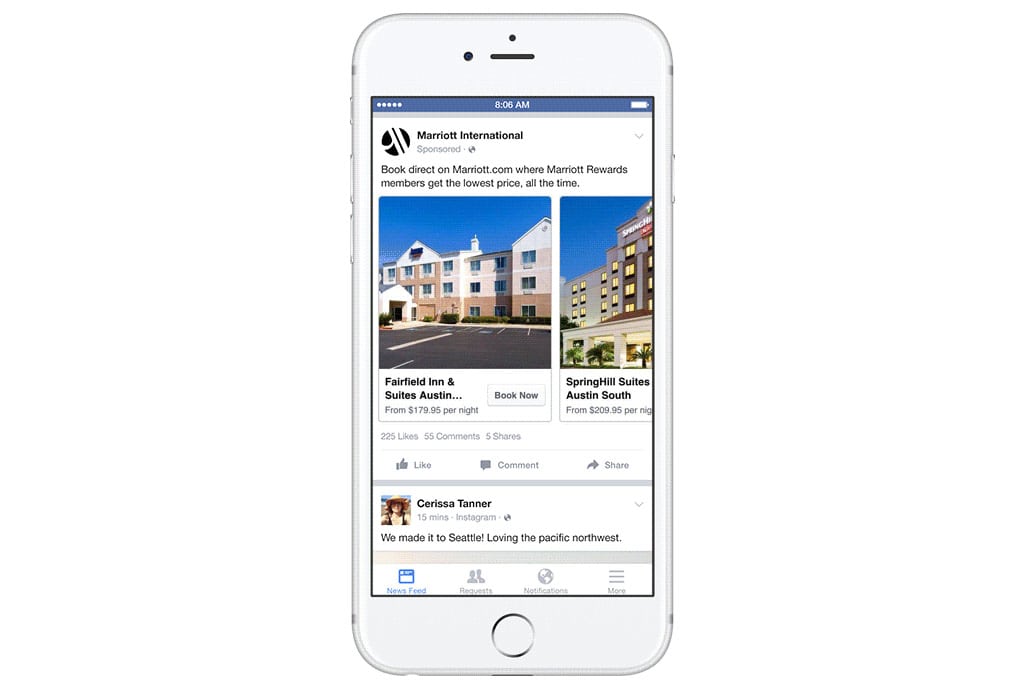Skift Take
Facebook has quickly gone from the experimental phase for many travel companies to a growing part of the advertising budget with its own line item. We see the importance of the platform for the travel industry continuing to grow.
Last week we launched the latest report in our Skift Research Reports service, A Deep Dive Into Facebook’s Impact on Travel.
Below is an excerpt from our Skift Research Report. Get the full report here to stay ahead of this trend.
Retargeting is perhaps the most important part of the advertising puzzle for the Facebook platform. For instance, if a person is searching for flights to London on April 3 to attend the Skift Forum Europe, but does not book anything, hotels can still advertise to that person when they open up the Facebook app or use the website version. The attractiveness here is three-fold for the hotel.
First, a hotel can target an ad at someone it knows is actually highly interested in visiting that destination on a specific date.
Second, the cost to run that ad will be lower than broader mass targeted ads (television, print).
Third, the conversion should be higher than other formats given the specificity and relevance of the audience.
More simplistically, hotels can also retarget people visiting their own brand.com website.
Cross-Device Capabilities: A typical path for a vacation booking would be as follows:
- After the background search on Google about what destination to choose, a person will typically check flights.
- In this example, we assume the search was done on a browser.
- As long as Facebook log-in information is saved in the background and the travel site partners in any way with Facebook, Facebook can capture the search activity; a person does not have to physically log in on each search.
- Most of us do not book the trip on the first stage of flight research. We’ll often gauge pricing of a few destinations and talk to our family or friends or significant others about the results. Days may pass before we go back and look to book a trip.
- In the meantime, when the person opens up the Facebook app on their phone (how most people use Facebook now), hotels can show ads to that person for the destination and date searched for. The ads appear in the news feed and given the relevancy, they likely will at least be opened and looked at.
- Facebook uses identification at the personal level (i.e. my Facebook account rather than a cookie for my IP address that guesses it’s still me). This allows Facebook to more accurately capture actions across devices.
- The person books a hotel to stay for two nights.
- The hotel would have paid based on the click or impression, but when calculating ROI and effectiveness of ad campaigns, it would then attribute the booking to the advertisement.
Preview and Buy the Full Report
Subscribe now to Skift Research Reports
This is the latest in a series of twice-monthly reports aimed at analyzing the fault lines of disruption in travel. These Research reports are intended for the busy travel industry decision maker. Tap into the opinions and insights of our seasoned network of staffers and contributors. Over 100 hours of desk research, data collection, and/or analysis goes into each report.
After you subscribe, you will gain access to our entire vault of reports conducted on topics ranging from technology to marketing strategy to deep-dives on key travel brands. Reports are available online in a responsive design format, or you can also buy each report a la carte at a higher price.
The Daily Newsletter
Our daily coverage of the global travel industry. Written by editors and analysts from across Skift’s brands.
Have a confidential tip for Skift? Get in touch
Tags: facebook, travel, travel ads
Photo credit: A mobile retargeting ad for Marriott International on Facebook. Retargeting is a crucial part of advertising on the Facebook platform. Facebook
